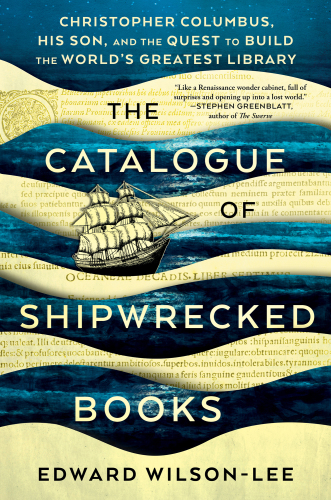
The Catalogue of Shipwrecked Books
Christopher Columbus, His Son, and the Quest to Build the World's Greatest Library
کتاب های مرتبط
- اطلاعات
- نقد و بررسی
- دیدگاه کاربران
نقد و بررسی

October 1, 2018
In the early 1500s, as the Age of Exploration dawned, a man named Hernando Colón aspired to building a great library that would encompass all books, in all languages, and featuring all matter of material, from scholarly tomes to popular ballads and pornography. That he was the out-of-wedlock son of Christopher Columbus aided his visionary quest; he first traveled to the New World with his father, enduring shipwreck and mutiny, and then through Europe to acquire thousands and thousands of volumes. From a Fellow in English at Sidney Sussex College, Cambridge; with a 75,000-copy first printing.
Copyright 2018 Library Journal, LLC Used with permission.

January 1, 2019
The story of Christopher Columbus' illegitimate son who became a humanist and scholar in the age of Renaissance and Reformation.In 1502, 13-year-old Hernando Colón (1488-1539) accompanied his father on his last trans-Atlantic voyage, a disastrous expedition marked by mutiny, betrayal, storms, and starvation. Columbus returned to Spain a broken man, though no less a hero in his son's eyes. Wilson-Lee (English/Sidney Sussex Coll., Cambridge; Shakespeare in Swahililand: Adventures with the Ever-Living Poet, 2016), drawing on rich historical and archival sources--including Hernando's writings--creates a thrilling narrative of the perils of 16th-century exploration, where the atmosphere onboard ship was rife with panic, paranoia, and rebellion; giant lizards crawled the shore; sharks circled menacingly in the waters; and sweltering, mosquito-infested islands were inhabited by hostile tribes. The author's focus, though, is not on Columbus but rather on Hernando, who became obsessed with two missions: to burnish his father's reputation and to amass a vast, comprehensive library of printed matter: books, images, pamphlets, and all manner of ephemera. For Hernando, his father's quest of circumnavigating the Earth was akin to "enclosing its knowledge in one library" and thereby gaining power and control over the unknown. Traveling extensively, he acquired thousands of books: 1,674 from Venice; 4,200 from a trip to northern Europe, and, eventually, 3,204 printed images, the largest collection in the world. His library swelled to over 15,000 volumes, making it the largest private collection in Europe. But even more astonishing than the sheer number of items was Hernando's intricate system of ordering. From an early 20-page handwritten index, an alphabetical key to the people, things, and concepts in Suetonius' Lives of the Twelve Caesars, Hernando developed several encyclopedias and inventories as well as a card catalog that enabled readers "to digest many volumes at a sitting, sorting relevant material from irrelevant." As Wilson-Lee aptly notes, with "profound intuition" about the potential of burgeoning printed information, Hernando created, in effect, the first "search engine."An elegantly written, absorbing portrait of a visionary man and his age.
COPYRIGHT(2019) Kirkus Reviews, ALL RIGHTS RESERVED.

























دیدگاه کاربران